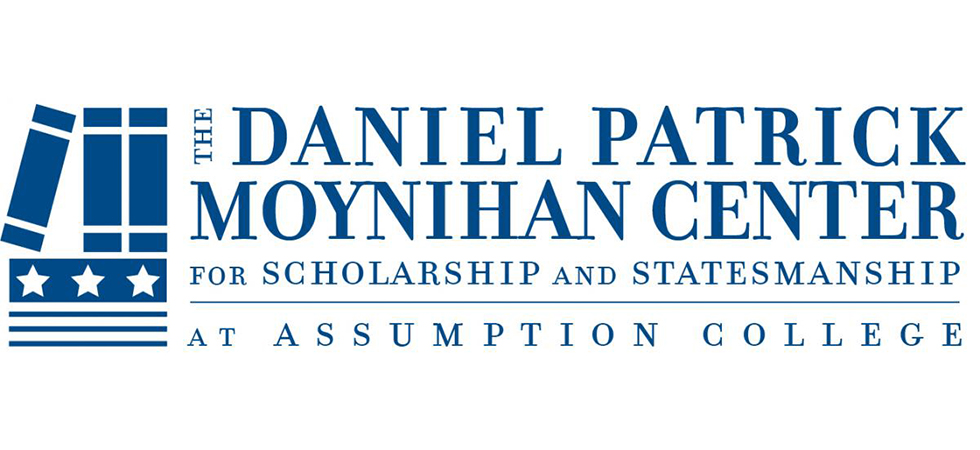Assumption to Establish Daniel Patrick Moynihan Center to Bridge Scholarship and Statesmanship

Assumption has announced the establishment of the Daniel Patrick Moynihan Center for Scholarship and Statesmanship, an endeavor with national reach that will cultivate thoughtful citizens who are inspired by the late senator’s example to appreciate the link between ideas and action.
The Institute is funded by generous grants from the Thomas W. Smith Foundation and the William and Flora Hewlett Foundation, whose Madison Initiative focuses on strengthening the values, norms and institutions of U.S. democracy—in particular, Congress—in a time of political polarization.
“Senator Moynihan is the most prominent example in recent American history of the tradition of the scholar-statesman that reaches back to Cicero, Edmund Burke, John Adams and James Madison,” said Greg Weiner, Ph.D., a professor of political science at Assumption, director of the Center, and author of American Burke: The Uncommon Liberalism of Daniel Patrick Moynihan. “It is a privilege to be able to honor him with a Center that seeks to cultivate the next generation of scholar-statesmen.”
Located in Assumption’s Department of Political Science, the Center will host a biannual gathering of undergraduate “Moynihan Fellows” in Washington, D.C., to discuss Senator’s Moynihan’s writings and to meet statesmen and stateswomen as well as prominent political thinkers. The Center will stimulate scholarship into Moynihan-inspired themes, especially among the emerging scholars whom Moynihan so often mentored. Such programs include a postdoctoral research fellow, efforts to republish Moynihan’s writings, and colloquia for scholars on Moynihan-inspired themes.
The Center is guided by an impressive advisory board – all of whom enjoyed a close working relationship with the late Senator — including Robert A. Katzmann, Ph.D., Chief Judge of the Second U.S. Circuit Court of Appeals (Sen. Moynihan’s teaching assistant at Harvard University); Sen. Moynihan’s former colleague Sen. J. Robert Kerrey; renowned Harvard University sociologist and frequent Moynihan collaborator Nathan Glazer; Stephen Hess, former advisor to Presidents Eisenhower and Nixon and senior fellow emeritus in the Governance Studies program at the Brookings Institution whom Sen. Moynihan served with in the White House; Joel Motley, a former Moynihan aide and now a managing director of Public Capital Advisors, LLC; Wendy Schiller, also a former Moynihan aide and the chair of the Government Department at Brown University; and George F. Will, the Pulitzer Prize-winning and nationally syndicated columnist for the Washington Post who was a close friend of Sen. Moynihan.
Quotations from several of members of the Advisory Board are included below.
Moynihan earned a doctorate from Tufts University, served in the cabinets or sub-cabinets of Presidents Kennedy, Johnson, Nixon and Ford in capacities that included assistant secretary of labor, assistant to the president for urban affairs, and served as Ambassador to India and Ambassador to the United Nations. He also taught at Harvard University and maintained an active and engaged scholarly life throughout his political career. In 1976, New York elected him to the first of four terms in the United States Senate, from which Moynihan retired in 2001. He died in 2003.
Weiner, the Center’s director, is a nationally recognized expert on the political thought of the American Founding. He has written extensively on topics such as James Madison, the separation of powers, the American Congress and Presidency and constitutional interpretation. He is the author of Madison’s Metronome: The Constitution, Majority Rule and the Tempo of American Politics, which, like American Burke, was published by the prestigious American Political Thought series of the University Press of Kansas that will also publish his forthcoming Independent of Heaven Itself: The Constitution and the Courts. He has published a number of opinion-editorial columns in The New York Times and Washington Post.
Comments from Members of the Daniel Patrick Moynihan Center for Scholarship and StatesmanshipAdvisory Board
“Daniel P. Moynihan was a true scholar statesman, and one doesn’t know which of these terms to put first, they were so wonderfully merged. One hopes the new Moynihan Center will promote this kind of merger among some with political ambitions, and some with scholarly ones.”
Nathan Glazer, renowned Harvard University sociologist and frequent Moynihan collaborator
“May the new center honoring Pat Moynihan reflect the joy that marked his life as an intellectual in public service.”
Stephen Hess, former advisor to Presidents Eisenhower and Nixon; senior fellow emeritus in the Governance Studies program at the Brookings Institution
“Daniel Patrick Moynihan was a deeply religious secular humanist who cared deeply about the lives of working Americans and the quality of the design of our buildings. Studying him is as good a route to take for those who care about the survival of our families, our communities and our Democracy.”
J. Robert Kerrey, former Senator from Nebraska
“Daniel Patrick Moynihan believed that social scientific inquiry was an integral part of a free society, and that knowledge was essential to holding government accountable for its actions, from the local town council to the Oval Office. The Daniel Patrick Moynihan Center for Scholarship and Statesmanship at Assumption creates an invaluable space where scholars and policy practitioners can come together to assess and debate the crucial issues of our time, guided by Daniel Patrick Moynihan’s lifetime body of scholarship and public service.”
Wendy Schiller, former Moynihan aide and chair of the Government Department at Brown University
“The social sciences, said Pat Moynihan, cannot tell us what to do, but it can tell us the results of what we are doing. Hence the frequent unpopularity of social scientists. Moynihan, the most accomplished intellectual in 20th-century American politics, gave to our democracy the inestimable gift of a good example — of brave and clear thinking amid the tumults of democracy.”
George F. Will, Pulitzer Prize-winning and nationally syndicated columnist for the Washington Post
